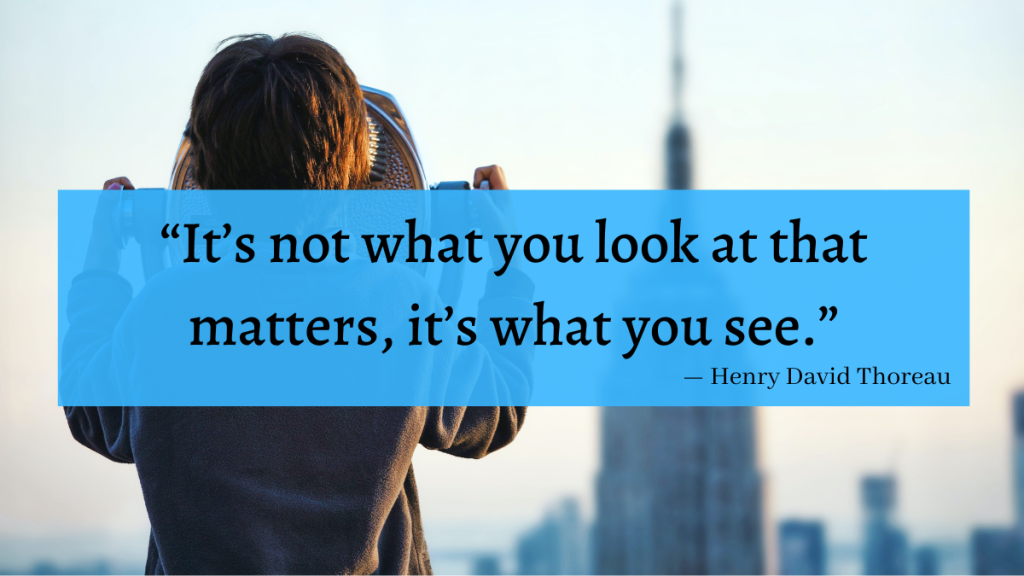Over the years, I’ve learned a number of words, phrases and definitions that have helped me understand my own mental health. Some of these are connected to mental illness or medicine, while others are connected to mental wellness. In this recurring series, I break down some of the mental health terms I’ve learned over the years. Today, I’ll be breaking down mental filters: what they are, what they look like, and what we can do about it.
What is a Mental Filter?
Like many mental health terms, this mental filters go by many names (negative filtering, mental filtering, filtered thinking) but the important thing to understand is understanding the definition. Filtered thinking is a type of cognitive distortion in which
“People diagnosed with panic disorder frequently use a mental filter to sift out all of the pleasant and fulfilling parts of their lives, while bringing more attention to their inadequacies and dissatisfaction.”
Very Well Mind
When people experience a mental filter they often bypass pleasant and positive thoughts, having a much clearer memory of the negative ones. We all have a tendency to do this from time to time, but it is the repetition of this that can cause problems. Over time, this filter can be easier to jump to and become more instinctual. Without meaning to, we’ve created a thought pattern that builds a mindset based on untrue assumptions and false thoughts that go unchallenged.
What Do Mental Filters Look Like?
Mental filters can be tricky unless you’re willing to call them out or see them in your own thinking. Filtered thinking can grow stronger when these thoughts aren’t challenged. People experiencing mental illness don’t always have the strength, knowledge or awareness to challenge these thoughts, which can allow a simple thought to grow into an unhealthy mindset.
Here’s a (fictional) example. Last week, I went to the movies. I enjoyed the movie and had a fun time with my friends; afterwards we got a bite to eat. Overall, it was a fun night. But during the movie, I spilled my soda slightly on my jeans. When I think about that night days or weeks later, the biggest memory that stands out is that I spilled on myself while I was trying to enjoy a movie. This filtered thinking reinforces the negative perception we have of ourselves. If it goes unchallenged, we’ve created a negative memory that conveniently leaves out the positive aspects in favor of more negative feelings.
Mental filters can sift out positive emotions in favor of negative ones. They can turn our irrational feelings into palatable, more rational thoughts. We’re not always going to catch when we’re filtering, but it’s the sheer magnitude of these thoughts that can create real issues and put a strain on our mental health.
What Can We Do About It?
Now that we know more about filtered thinking, what can we do about it? Recognizing when we’re filtering is an important first step. Once we recognize when we filter our thoughts, we can acknowledge these thoughts for what they are. But recognizing our own filtering is much easier in theory than in practice. Our filtered thinking ranges from smacking us in the face to being camouflage it takes years to see.
Mental filters don’t change what happened to us; they change the way we perceive those events, which can shift our perception of the world and our place in it. Once we’re able to acknowledge our filtered thinking, we can start to try and reframe these perceptions. Also known as cognitive reframing, reframing situations and events can help us filter out our negative perceptions of things, and replace them with a more objective/accurate view of things. It is widely used in an effort to grow positive thinking, but it also can be very helpful if you have trouble remembering things are are susceptible to negative thoughts.
Mental filters can be challenging to sort out but the more we know about them, the more we can start to see them in our own thought patterns. It’s not easy, but the effort alone can make a big difference in the way we see the world – and see ourselves.

One thought on “Breaking Down Mental Health Terms: What Are Mental Filters?”